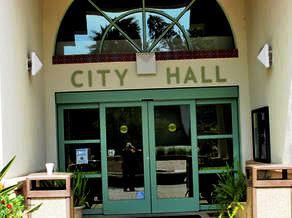Concerns raised about congestion as well as residential and commercial permits
The Avalon City Council last week discussed golf cart tours. No specific permit applications were on the agenda. The council took no action.
However, Councilmember Lisa Lavelle requested the discussion. Lavelle said she was concerned about congestion and wanted to address the matter before it became a problem.
Management Analyst Devin Hart said there were currently three guided golf cart tours in Avalon. Hart said they use a combination of commercial and residential autoettes.
In her report, Hart wrote that staff did not recommended further regulation of the tours.
According to her staff report, Catalina Island Guided Golf Cart Tours has three autoettes (two residential, one commercial); Avalon Local Tour has three autoettes (two residential, one commercial); and Catalina Island Golf Cart Tours has one autoette (residential).
“Since the issuance of the first transportation permit to provide guided golf cart tours in 2020 to present, there have been no accidents or complaints received by City Hall regarding operations,” Hart wrote.
Hart said the city had never observed golf cart tours operate outside regulations.
“During the same time period, there have been approximately 40 rental golf cart accidents—some resulting in medical evacuation from the Island. Guided tours are led by individuals that are familiar with the layout of town and the regular operation of a golf cart,” Hart wrote in her staff report.
Hart told the council that at this time, there are 198 commercial autoette permits in Avalon.
Councilmember Lavelle said she brought this up only because the city had gotten a few golf cart tour requests in the last year-and-a-half or so.
Lavelle said she wanted, one, to make sure they weren’t over-permitting businesses that were starting this type of business. Two, she said, she wanted to discuss residential autoettes that were already in Avalon and commercial autoettes that may be adding to congestion.
She said she appreciated Hart pulling the stats.
Councilmember Mary Schickling said she didn’t understand how a business could be allowed to have two residential autoettes and one commercial.
Hart said one autoette was allowed per address. She said in one instance the operator used their facility’s autoette and an employee used their vehicle.
“In the other instance, they’re a property owner so they use their personal vehicle and they have a property that’s unrented and that they associate the vehicle with,” Hart said.
Yolanda Say said she appreciated Lavelle’s concerns. “I am very happy with the golf cart company, because our staff has a hard time renting golf carts, because they’re always sold out for one,” Say said.
She said their staff was able to use the tour company. It’s safe.
“It’s not our problem if there’s too many businesses. It’s competition,” she said.
“You can’t say ‘Are there too many bars in Catalina?’” she said.
That brought chuckles from the people in the Council Chambers.
She said she appreciates anyone who is willing to take financial risk and work hard to create great experiences for visitors.
“We do have a golf cart problem. We do have a vehicle problem. But I think we need to address that,” she said.
Councilmember Michael Ponce said he understood Lavelle’s concern, but it was looking for a solution when there’s not yet a problem. He suggested keeping vigilant and seeing how things play out.
He called golf tours “one of the best ways to see Avalon.”
He said you get to meet people and tell them about the town that you love.
He argued that golf cart tours had not caused congestion.
Councilmember Yesenia De La Rosa she was glad Lavelle brought up the issue. She said she was glad Hart provided the statistics.
“These all tie in,” De La Rosa said. “They all play a part. We’re not trying to restrict anything.”
“I just think we’re trying to make sure that everything does flow,” De La Rosa said.
Mayor Anni Marshall asked if golf cart accidents had led to lawsuits against the city.
“I think we’ve had one in 13 years,” said City Attorney Scott Campbell.
“I don’t have a problem with them at all,” Schickling said.
Lavelle said she was fine with people using residential autoettes because they are already here. “There is a congestion issue,” Lavelle said.
According to Lavelle, it makes sense to use an autoette that’s already here, but it doesn’t make sense to add a seccond autoette that adds to congestion. According to Lavelle, the city could address the issues incrementally or stop issues from happening ahead of time.
Schickling asked if the issue was the parking congestion or the congestion caused when the golf carts are on the streets.
Lavelle said she would argue that the primary issue was driving. She also said that people still complain about parking congestion.
Ponce said he didn’t mind a discussion about limiting autoettes.
“To throw that on a guided tour, to me that’s two different subjects,” Ponce said.
He said he wouldn’t object to discussing limits on commercial autoettes, rental or non-rental.
Schickling agreed that they were two separate isssues.
De La Rosa asked if Lavelle was just referring to applications in the future.
Lavelle said yes. “I don’t have an issue with the current businesses,” she said.
Yolanda Say said she was confused about why this was brought up.
Lavelle said this was part of a conversation from when a few applications came through. “No, it has nothing to do with individual businesses that currently have licenses,” Lavelle said.
Say argued that the problem with commercial autoettes is that they don’t apply to permits. She also argued that there was a lack of enforcement.
“There is where we need to start,” she said.
Once said citizens of Paris had just passed law banning electric scooters because they were dangerous.
City Manager David Maistros cautioned the council about putting a limit or a cap on something without thinking it through.
He seemed to be arguing that a cap or limit could add value to something. He cited the example of e-bikes selling for high prices because limits had created an added value.
Lavelle said she wanted to avoid that. She said she apprecicated the council taking time to discuss the issue.











